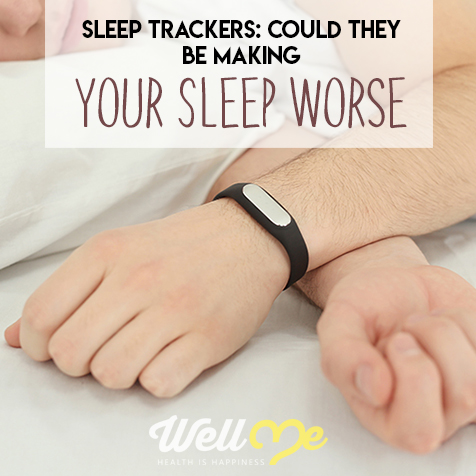Sleep trackers are all the rage right now – they are the perfect combination of millennial technology and the human need to cram efficiency into every area of life. This is obvious from the number of sleep tracker apps available on smartphones, with thousands of clones and even an official Apple integrated sleep tracker. Clearly, there has been a lot of demand for these products.
These apps are used by millions of Americans to track their sleeping patterns in an attempt to improve sleep quality and boost productivity. You might have seen this type of technology on the internet or TV and wondered ‘does It actually work?’. Today, we’re going to take you through the benefits and dangers of sleep trackers, and their real effect on your sleep.
What’s the Point?
Sleep trackers are designed to measure the length and structure of your sleep. They measure your heart rate, movement, and activity while you sleep – data that is supposedly useful for improving sleep quality and reinforcing a regular sleep pattern. With estimates for the rate of insomnia between 6% and 18% for all Americans[1], you might see a lot of value in this sort of technology.
Insomnia is not a trivial problem – poor sleep quality has been shown to have serious negative effects on health and wellbeing, with serious implications for hormonal health[2]. We’ve stressed the importance of getting adequate sleep before, but this is even more important for those who are young, under a lot of stress, or looking to make the best possible progress with health, fitness, and sports performance.
In the rush towards human optimization, it is easy to get caught up in promising technologies that pretend to be scientific. When using sleep trackers, it is important to practice a healthy skepticism and look at the research underpinning your favorite new app.
Sleep Trackers – Do They Even Work?
The first, and perhaps most important question, is whether sleep trackers actually work. Recent research and the opinions of the neuroscientific community appear to suggest otherwise. The use of sleep trackers is a poor substitute for real sleep analysis – the metrics used for determining quality sleep are poorly-conceived by sleep trackers and their sensors and measurements are not accurate[3].
The real problem here is sensor accuracy – the apps and devices used for sleep trackers do not have the scientific rigor that would be necessary to develop a real understanding of the quality and efficiency of sleep.
The fundamental problem is that there are some things that are too complicated to measure with a wrist band and a smartphone: the field of neuroscience relies on incredibly sophisticated technology and there’s a good chance that your wristband isn’t going to have the same qualitative abilities as a polysomnograph.
The clear majority of sleep trackers are put to market with no supporting evidence, with only 3 branded sleep trackers having independent research presented (from those covered in Finkelstein’s Critical review). Among the research that supposedly confirmed the effectiveness of these devices, their measured effects for detecting wakefulness (the extent to which you are asleep) was low (such as 49% or 19.8%) or varied largely from measure to measure (between 78% and 83.5%).
The research clearly shows that sleep trackers are, at best, 78% accurate at measuring whether or not you’re actually asleep, and even less effective at determining how asleep you might be.
This makes it incredibly difficult to measure sleep quality using such tracker tools – they are often less than 50% accurate, or simply fail to repeat the same results for the same quality of sleep. This makes them near-impossible to use consistently with much effect: how useful is a sleep tracker that only has 50% accuracy in tracking the rate and quality of sleep?
How Does Inaccuracy Hurt Users?
The real concern with sleep trackers is how their inaccuracy can hurt you, or other customers like you, who might be using these devices as a stepping stone towards treating insomnia or sleep deprivation. The companies in charge of developing sleep trackers are responsible for the use of their product among millions of Americans and misinformation on this scale is a serious problem.
The central problem is that Americans are using sleep tracker apps and devices to try to self-treat their poor sleep quality or to combat sleep-related disorders. The use of such apps, therefore, has a real impact on the lives of these people.
Using a sleep tracker can lead you to chasing the best possible readings on the sleep tracker, which may have nothing to do with the real quality of your sleep. We’ve seen hundreds of reviews that suggest that high quality sleep and high scores on sleep trackers are totally different[4].
Sleep trackers are another example of poorly-designed health and fitness merchandise being sold to those who have genuine physiological problems. There is no difference between the miracle diet pill that doesn’t work and the sleep tracker that doesn’t actually help to improve sleep – users of these apps are hurt by being fed misinformation.
These apps promote something totally different to “best practice” and can further confuse individuals who are suffering from a real sleep disorder[5].
How Can You Really Improve Sleep Quality?
Improving sleep quality is much simpler than using a sleep tracker and it might be as simple as increasing the amount of sleep you get. Tracking your sleep is no use if you’re not getting enough sleep to begin with – no matter how well you time your sleep cycles, 8 hours of sleep is still the minimum your body needs for maximum alertness and recovery[6].
Start by ensuring that you get enough sleep first, then worry about ‘earning your sleep’. This simply refers to the fact that “sleepiness” is a great predictor of sleep quality[7]: spend your late evening reading, performing core and flexibility exercises, and generally performing tasks that will contribute to making you tired.
Be sure to avoid screens (replace all artificial light with softer light, where possible), reduce overall light and sound, and focus on actively relaxing.

Sleep tracker aren’t awful and the designers of sleep trackers aren’t monsters trying to rob you of your sleep – they’re more likely to be uninformed app developers looking to make a quick buck on the boom in biohacking.
Spend your time and money well and avoid sleep trackers – or at least don’t take them too seriously. Sleep quality is tied to activity, nutrition, and an effective bedtime routine. If you master these simple lifestyle basics, the rest will follow: you’ll improve the quality of your sleep, which will make big changes to your waking hours.
References
- [1] Ohayon, M. “Epidemiology of Insomnia”. Sleep Medicine Reviews. 2002, 6(2): 91-111. <http://www.sciencedirect.com/science/article/pii/S1087079202901863>
- [2] Vgontzas, Alexandros N., et al. “Sleep deprivation effects on the activity of the hypothalamic–pituitary–adrenal and growth axes: potential clinical implications.” Clinical endocrinology. 1999, 51.2: 205-215. <http://onlinelibrary.wiley.com/doi/10.1046/j.1365-2265.1999.00763.x/full>
- [3] Jeon, L. E. E., and Joseph Finkelstein. “Consumer sleep tracking devices: a critical review.” Digital Healthcare Empowering Europeans: Proceedings of MIE2015. 2015, 210: 458.
- [4] Yang, Rayoung, et al. “When fitness trackers don’t’fit’: end-user difficulties in the assessment of personal tracking device accuracy.” Proceedings of the 2015 ACM International Joint Conference on Pervasive and Ubiquitous Computing. ACM, 2015. <http://dl.acm.org/citation.cfm?id=2804269>
- [5] Jeon, L. E. E., and Joseph Finkelstein. “Consumer sleep tracking devices: a critical review.” Digital Healthcare Empowering Europeans: Proceedings of MIE2015 210 (2015): 458. < https://books.google.co.uk/books?hl=en&lr=&id=SDgxCgAAQBAJ&oi=fnd&pg=PA458&dq=sleep+tracker+accuracy&ots=962kArO1go&sig=jFKM5cDnHvonFdT6YxD0LzbfQPY >
- [6] Bonnet, M H, and Arrand, D. “We are chronically sleep deprived.” Sleep. 199, 18.10: 908-911. < https://academic.oup.com/sleep/article/18/10/908/2749701>
- [7] Pilcher, J J, Ginter, D R, and Sadowsky, B. “Sleep quality versus sleep quantity: relationships between sleep and measures of health, well-being and sleepiness in college students.” Journal of psychosomatic research. 1997, 42.6: 583-596. < http://www.sciencedirect.com/science/article/pii/S0022399997000044>







